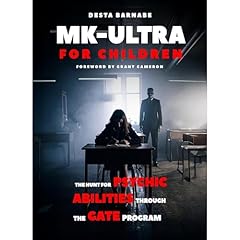
Project MK-Ultra
The History of the CIA’s Controversial Human Experimentation Program
No se pudo agregar al carrito
Add to Cart failed.
Error al Agregar a Lista de Deseos.
Error al eliminar de la lista de deseos.
Error al añadir a tu biblioteca
Error al seguir el podcast
Error al dejar de seguir el podcast
 Exclusivo para miembros Prime: ¿Nuevo en Audible? Obtén 2 audiolibros gratis con tu prueba.
Exclusivo para miembros Prime: ¿Nuevo en Audible? Obtén 2 audiolibros gratis con tu prueba.Compra ahora por $9.76
-
Narrado por:
-
Colin Fluxman
"The target of this ‘brain warfare’ is the minds of men both on a collective and on an individual basis. Its aim is to condition the mind so that it no longer reacts on a free will or rational basis but responds to impulses implanted from outside.... The Soviets are now using brain perversion techniques as one of their main weapons in preempting the cold war. Some of these techniques are so subtle and so abhorrent to our way of life that we have recoiled from facing up to them.” (CIA Director Allen Dulles, 1953)
“The medical trials at Nuremberg in 1947 deeply impressed upon the world that experimentation with unknowing human subjects is morally and legally unacceptable. The United States Military Tribunal established the Nuremberg Code as a standard against which to judge German scientists who experimented with human subjects.... [I]n defiance of this principle, military intelligence officials ... began surreptitiously testing chemical and biological materials, including LSD.” (U.S. Supreme Court Justice William Brennan)
Since the early days of human warfare, which may date back to the Stone Age, combatants have sought to gain an advantage through the acquisition of secret information. With the growth of technology, a parallel advantage was sought through the application of numerous types of torture. In the 19th century, the concept of manipulation was added to military tactics, an attempt to influence the minds of assassins, double agents, and world leaders alike to act against their natures. Given the incredible advances in technology brought about by global warfare, the years immediately after World War II would bring about the most extensive formal study of the many procedures by which this effect could be accomplished.
In America, studies drawn from enemy experts from the recent war introduced mass testing into the general population and further diminished the oversight through sanctioned government research, particularly the military. Under threat from world powers, real or imagined, the greatest abuse of psychology ever known in the West would be led by a legion of medical officials riding a wave of paranoia. Stopping it was unthinkably unpatriotic, and keeping its abuses hidden was a matter of cooperation at every level of government.
The push to develop torture and manipulation techniques was driven by an “exaggerated fear” propagated by the American military and national press of “mind-control.” American officials believed that Soviet, Chinese, and North Korean communists had reached the “Holy Grail” of mental warfare, and that the United States must follow suit or be left behind. In time, the “transformation of brainwashing from a system of coercive propaganda to a secret program of human enslavement” reflected cultural demands placed on the idea by the Korean War and was preceded by interest in electromagnetics. To the embarrassment of many Americans, 5,000 of the 7,200 American POWs in North Korea signed confessions and petitions to end the war. Most recanted their actions once free, but many did not, and some refused to return to their homeland.
In the end, the peak of the American experimental regimen on unwitting humans grew to vast proportions and splintered into a myriad of disciplines by the mid-20th century. The program came to be known as MK-Ultra after several early incarnations, and to this day, the name has become synonymous with controversy, even as the program’s experiments and results remain relatively mysterious.
©2022 Charles River Editors (P)2022 Charles River EditorsLos oyentes también disfrutaron:




















Las personas que vieron esto también vieron:


















concise presentation
Se ha producido un error. Vuelve a intentarlo dentro de unos minutos.
Simulacra and Simulation
If you search for it you found it. Get it.
Se ha producido un error. Vuelve a intentarlo dentro de unos minutos.
Mind Blowing Truths!
Se ha producido un error. Vuelve a intentarlo dentro de unos minutos.
great
Se ha producido un error. Vuelve a intentarlo dentro de unos minutos.
You’ll need more books
Se ha producido un error. Vuelve a intentarlo dentro de unos minutos.


